Throughout the night we were beset by a thunderstorm, and I was beset by a barometric pressure headache.
I wasn’t up to much this morning, but Jackie persuaded me to go for a drive this afternoon. Most of the areas to the east that we normally visit were far too crowded either to park or to photograph with ease.
The exception was the village of Pilley where
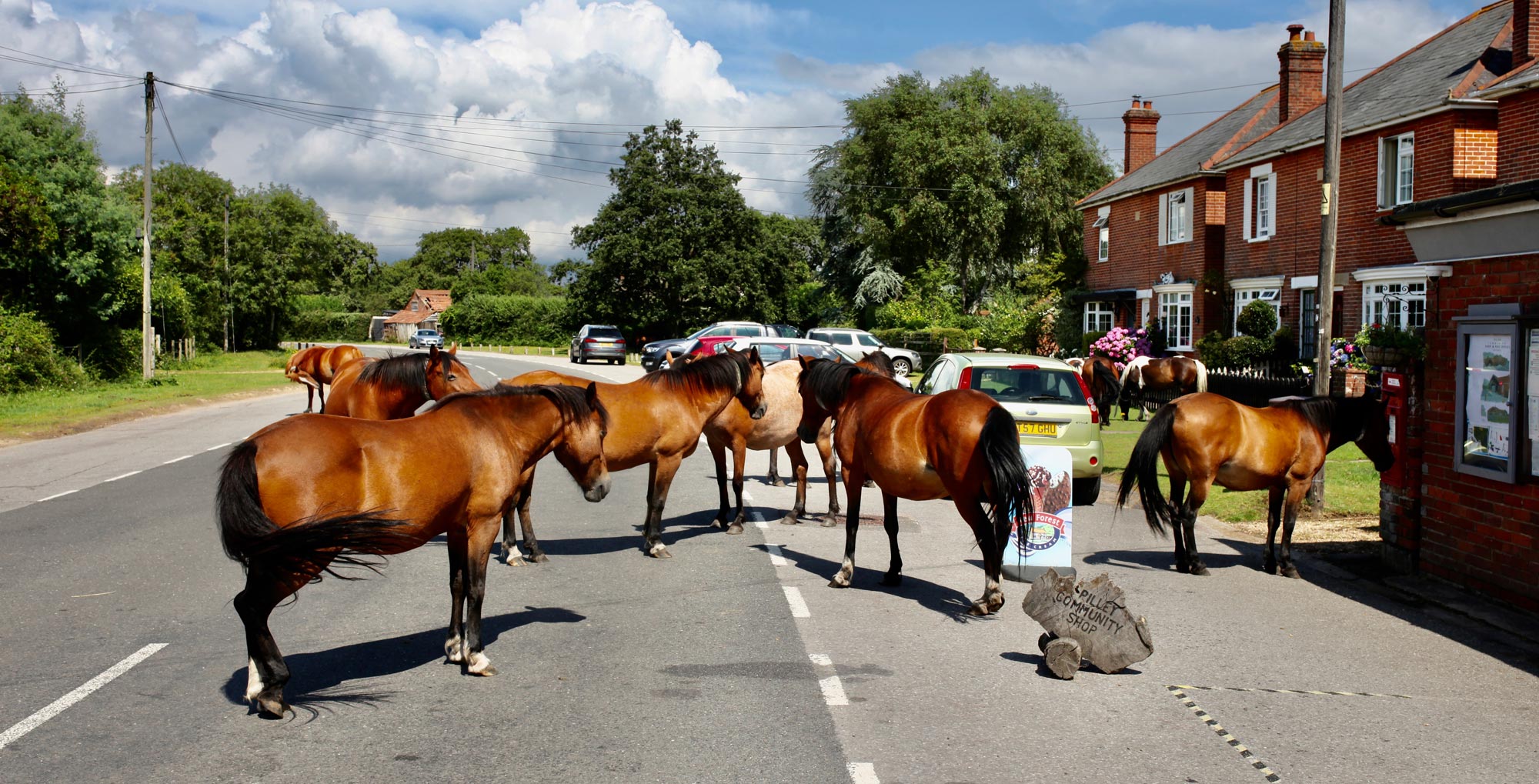
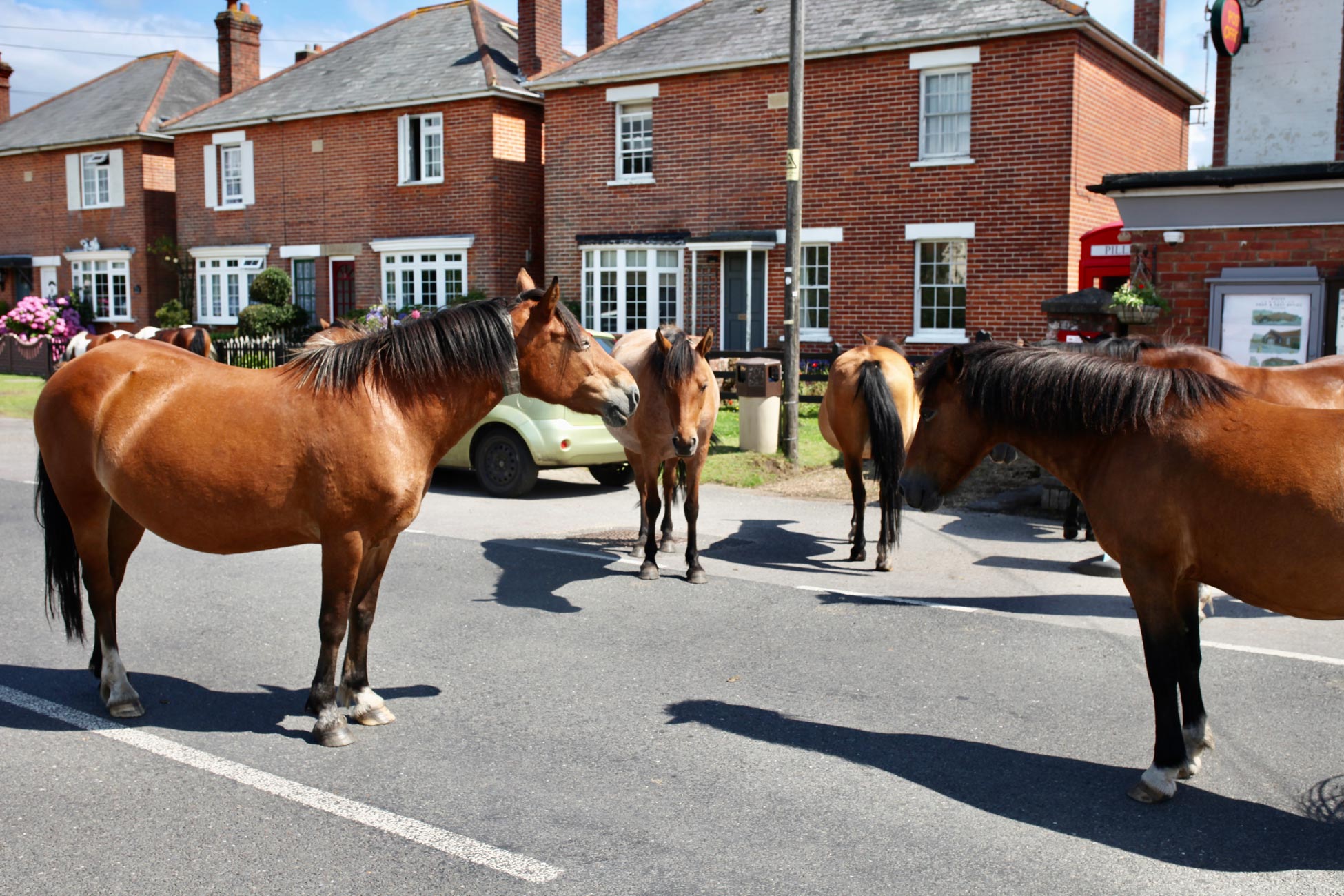
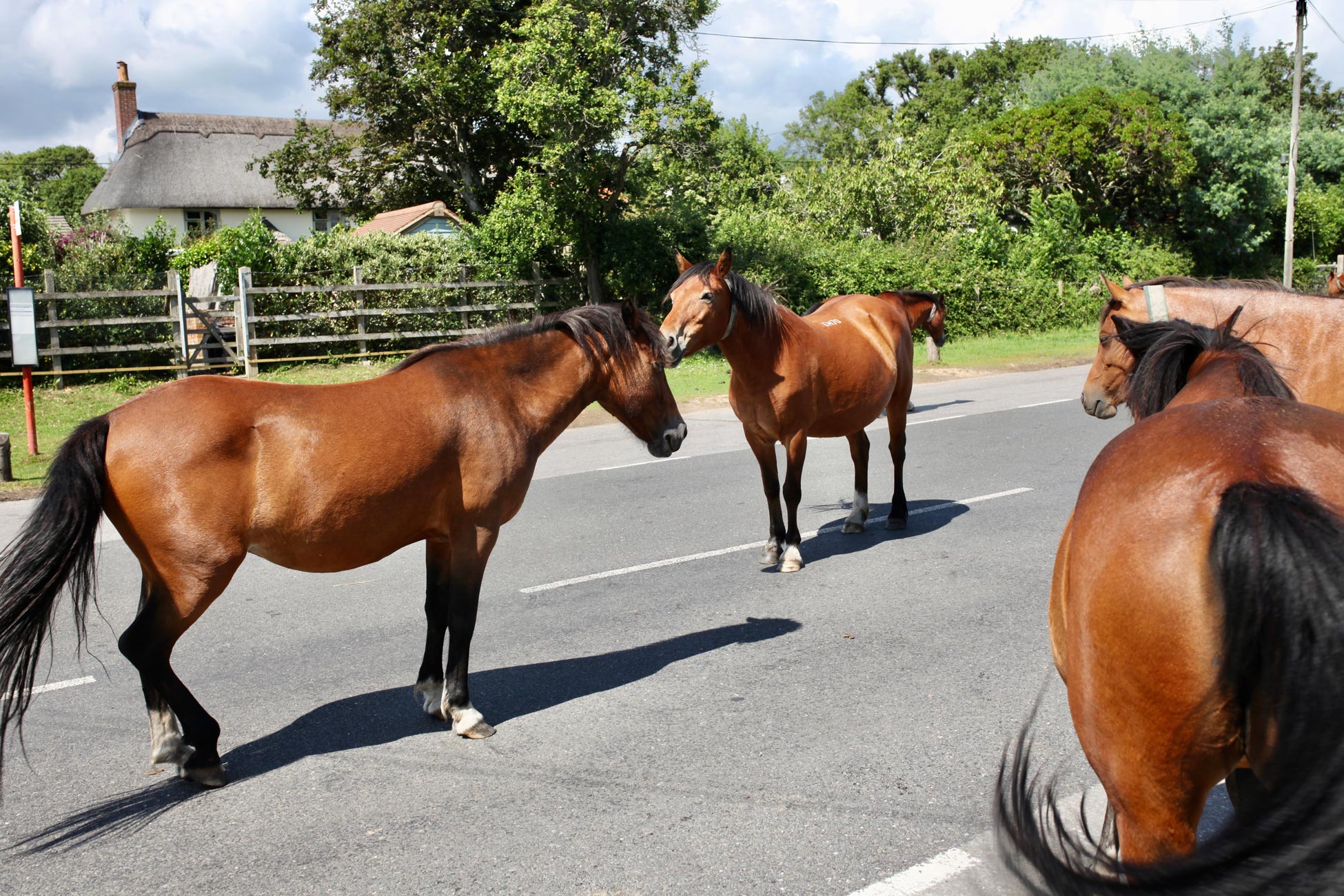
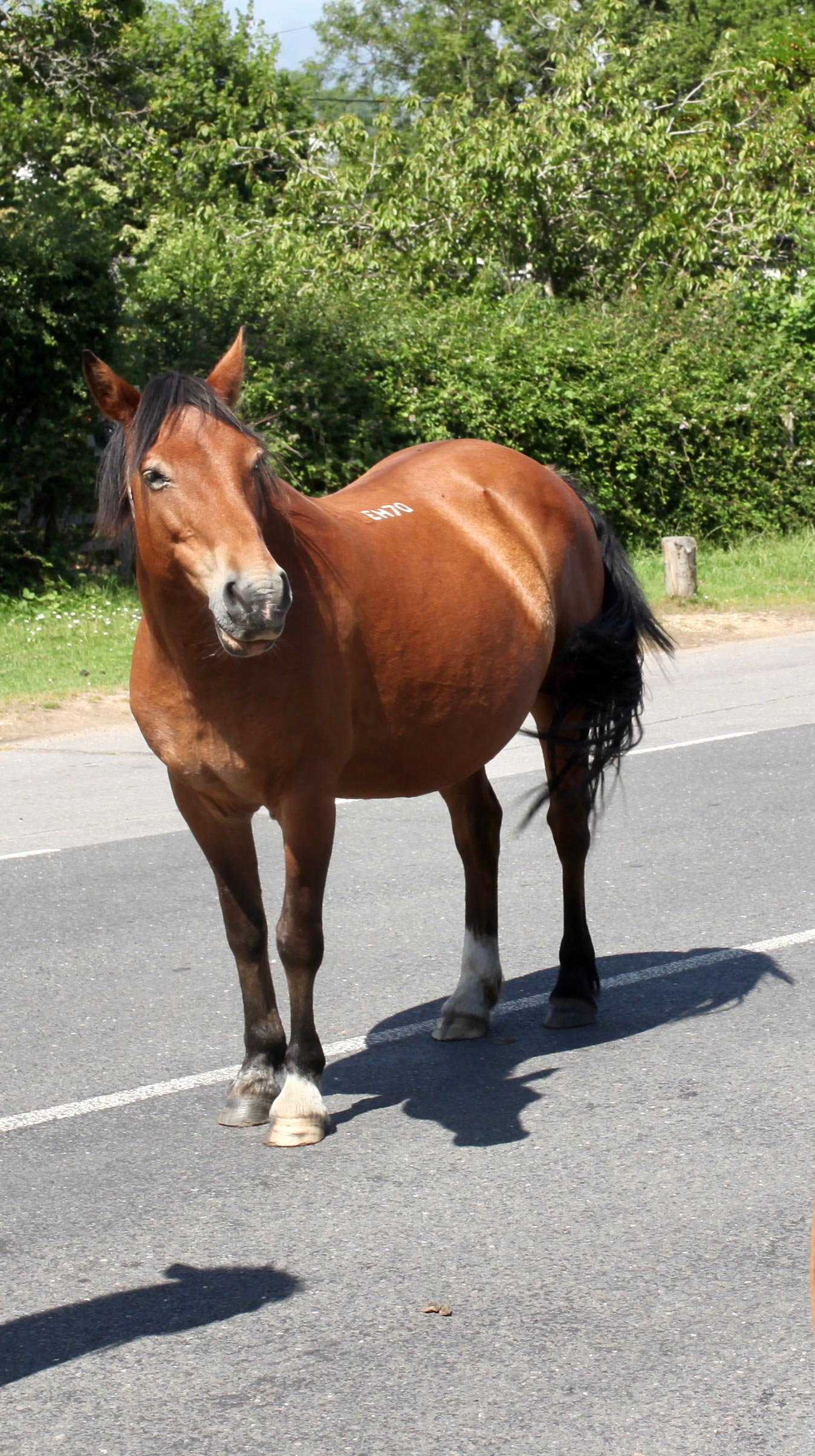
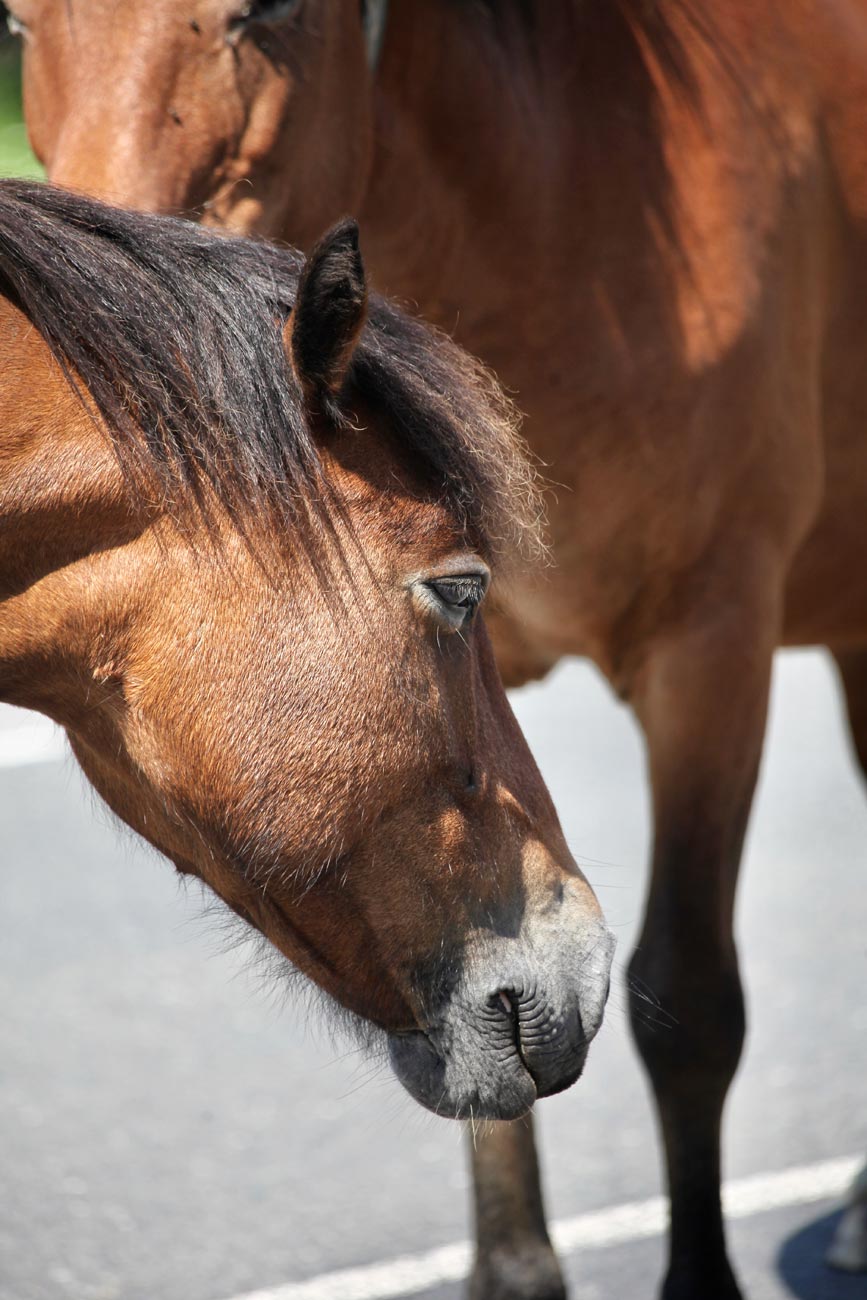


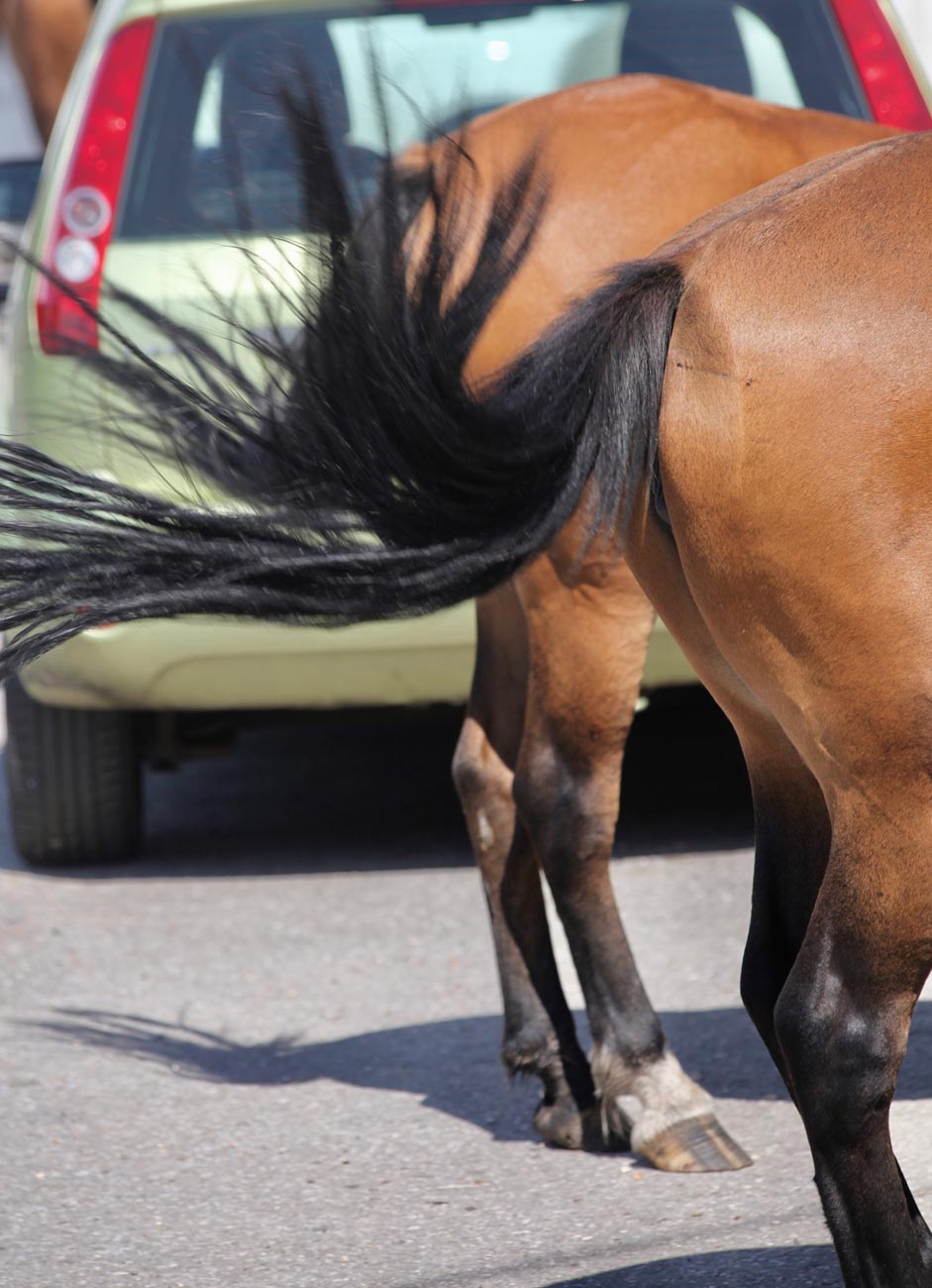
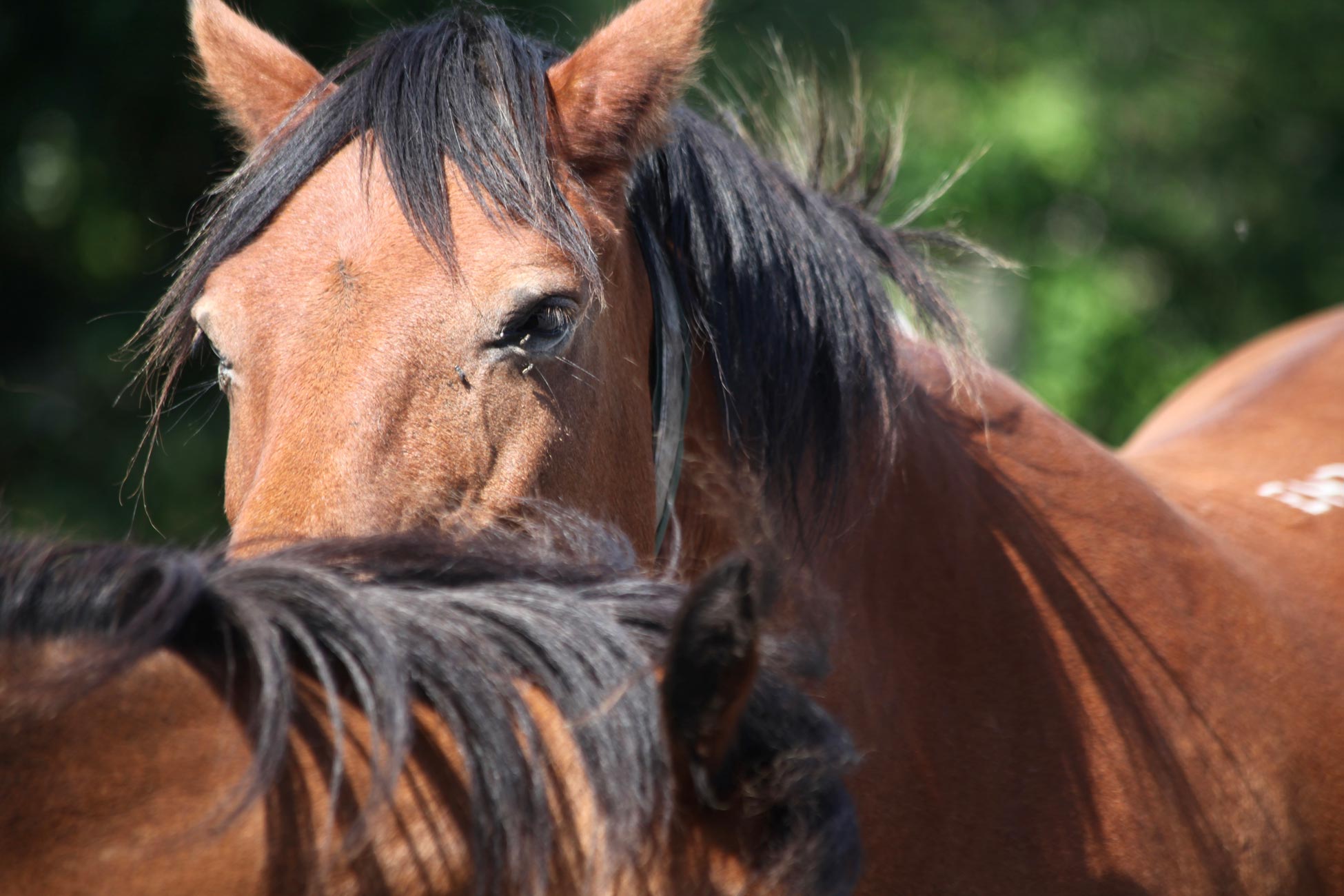

ponies spilled across the road outside the Community Shop. The pair occupying the centre of the tarmac completely ignored passing traffic. Tails used as whisks, stamping of hooves, and amazing tolerance were the main defences against the gathering fly population.
____________
Later, I redrafted the third episode of my life story.
There was no National Health Service when my mother brought me home to her parents seven weeks after my birth. It did not come into being until I was six years old. The necessary treatment was free because Dad was in the Army.
We came home to rationing, described thus by Wikipedia: ‘To deal with sometimes extreme shortages, the Ministry of Food instituted a system of rationing. To buy most rationed items, each person had to register at chosen shops and was provided with a ration book containing coupons. The shopkeeper was provided with enough food for registered customers. Purchasers had to take ration books with them when shopping, so the relevant coupon or coupons could be cancelled.’
Excepting only vegetables and bread, every consumer item we now take for granted, from food to furniture; from suits to sweets; from butter to Brylcreem; was in such short supply that if you had insufficient specific stamps there could be no purchase.

This is a pictorial image from http://bookcoverimgs.com/food-ration-books-ww2/ displaying one adult’s weekly food allowance per week. There was some variation in quantity according to supply, but this was probably the correct allocation when I was a baby and couldn’t eat any of it anyway.

In the early summer of 1943, my Dad may have been on official leave from the army, in which he spent the war years and a couple more. It is he in whose arms I seem to be struggling in this photograph. Mum, who was there at the time, assures me that I knew Dad well and was fond of him, so I must just have been distracted as the picture was being taken by my maternal grandfather. It is not every child of those years who had the opportunity to form a relationship with his father. I will always be grateful for that, and for the efforts my parents went to to nurture it.
Grandpa Hunter not only held the camera, but he developed the film and printed the shot in a complicated darkroom process.
This of course was long before four year olds like Malachi, his great-great-grandson, who had his own WordPress blog, could take a colour photo with a mobile phone, download it, and post it around the world on the very same day.
This evening we dined on succulent Hunter’s Chicken; boiled potatoes; firm cauliflower, and tender runner beans, with which Jackie finished the Sauvignon Blanc, and I finished the Syrah.
I liked all the blog, specially the horses, they are amazing
Thanks very much, Mina
Most welcome
Word has gotten around Derrick, those horses were keen for you to photograph them.
Thanks a lot, Sheree 🙂
Lovely animals, and I’m so happy you’re writing your life story! Wonderful photo of you with your father:)
Thank you very much, Becky. I am pleased
I enjoyed reading about your early years and your father. I missed the previous posts and will need to go back to catch up. We do indeed take a lot for granted that the basics in our lives are met.
Thanks very much, Barbara
That’s a wonderful photo of you and your father, Derrick. And so many horses roaming the village, wow!
And is that some kind of vegetables growing in the background of photo with Dad, or flowers?
We can’t quite discern, Gwen – but given the poles and wartime, I think vegetables, perhaps beans, most likely. Thanks a lot
I thought beans too. Something that needs a pole … and a giant at the top (as your Dad must have seemed to you at the time).
🙂
The horses are truly stunning.
Thanks very much, Gary
I’m sorry to hear you had another headache Derrick. I don’t know if you’re much on taking vitamin supplements, but when I started to take Magnesium many years ago, it pretty much eliminated my barometer headaches. I love the photo of you and your father!
Thanks very much, Jill. Taking paracetamol early seems to help – I don’t normally take that. I’ll bear the magnesium in mind.
Our local horses are being driven to distraction by horseflies this summer. I can remember dropping a lot of eggs when i was very very young and they were rationed. I just enjoyed seeing the mess they made. We were living with two other families and everyone was very calm about it.
A great memory from you, Tootlepedal. I can just see it 🙂 Thanks very much.
Another lovely family snippet thank you. Hope you feel a little better.
I’m fine, today, Sue. I guess I’m going to have to keep an eye on the Met reports. Thanks very much.
those ponies gathering at the community shop – and not a care in the world of the “contraptions” that are nowadays the rulers of their traditional trails…
I am too young to have any knowledge of rationing but I have read that it wasn’t just food but also clothing (material: fabric and yarn) that was short supply. Civilians would survive but our front line people required regulation clothing. That is also the time when using a spinning wheel was a big trend, you could spin your wool and knit – and knit and knit!
Thanks very much, Catherine. I remember the continuing immediate post-war rationing until the early ’50s.
Rationing, and all the work that went into it is a fascinating subject. They do say that the average diet improved during the war and that kids were healthier than those born earlier. You seem to have timed it just right. 🙂
Thanks a lot, Quercus. My teeth are grateful for the lack of sweets during those years
Yes, there are a number of silver linings to rationing.
That’s such a sweet picture of you and your dad. The writing is going well, then?
Yes, Liz. The writing was done a few years ago in response to prompts from readers, so I just have to tidy it up a bit. I got stuck in 1972, so will probably leave it there. Thanks very much.
You’re welcome, Derrick. Will you be publishing it as a book?
Sometimes a blunt statement of fact has enough in it to write a history. “It is not every child of those years who had the opportunity to form a relationship with his father.” I actually wonder how many. I know my mother was born (WW1) at about the same time that her father was killed on the Somme.
So very true, John. How tragic for your mother and such a waste of life. Thanks very much
Yes, this statement hit me too. <3
Thanks a lot, Jodie X
A lovely picture of you and your dad. I was one of those children who didn’t see my dad for the first two and-a-half years of my life. He was fighting in Italy and France by then.
Thanks very much, Nicki. This reinforces how lucky I was.
I feel sorry for the headache you had and hope you have fully recovered from it now. That is a sweet photo packing a slice of life from the long gone past. You certainly look unhappy being photographed —perhaps you were interrupted in course of your favourite indulgence.
Thanks a lot, Uma. Headache gone – I guess this is something sudden low pressure is going to give me now. Jackie agrees with your thought that I just wanted to get down.
I love that old photo of your and your father. You probably wanted to get down and play in the garden.
That is exactly Jackie’s thought, JoAnna. Thanks a lot.
I vaguely remember playing with ration points and coupons at the end of the war — but even more I remember preparing CARE packages for my mother’s relatives in England. I love the ponies in their parade — are they shod, or are those hoofs completely bare?
Thanks very much, Janet. That is a good memory of yours. The ponies are not shod, but they don’t seem to have problems with that
Another memory involving rationing — we lived about two miles from downtown — once a month we would pile in the car and drive downtown, using just about all our monthly gasoline allowance, then walk to all the utility companies and pay the monthly bills. If there was money left, we would have lunch too, before driving home.
Nice one
I was young but I still remember the rationing and the long queues to get your ration…
The horses are enjoying their day too 😉
Thanks very much, Ribana. The long queues is a good addition to the post.
You got some great shots of the ponies in the road Derrick! Beautiful part of the country Hampshire is. I remember all the wild ponies when my aunt who lived in Hampshire next to a field, so sometimes she’d have several peering into her garden hoping she’d pick some apples from her tree for them to eat… they knew where to get free apples and a gentle pat on the head! 😀
That’s a very mean amount of food for one person per week in war time. I’m surprised there was so much sugar in that bowl, I thought sugar was severely rationed. also surprised at how little butter was allowed. Must have been a lot of dry bread eaten and very hard to cope on that limited food. I hope we don’t have rationing introduced because of the Brexit situation… some people seem to think it might happen if there are signifiant shortages. The world is becoming a bit of strange place lately! I hope you are doing okay in Hampshire?
I love your picture with your Dad!❤️ Yes it was true, so many didn’t have the opportunity to know their fathers and in some cases never saw them again. My Mum had a lot of separation from both parents, divorce, and a mental breakdown of her mother left her and her siblings in children’s homes. She never saw her father again but was reunited with her siblings and mother when she was in her late teens. So I got to have a two grandmothers, but sadly no grandfathers… they’d already passed away by the time I was born.
Thank you very much, Suzy. I have been photographing since I was 15 (63 years ago). I have scanned everything on film (up to 2012), so many of my pictures, especially in my earlier posts, will count as vintage in some eyes 🙂 I also like to trigger other people’s memories, as even with your Hampshire aunt from today’s pictures.
Your Mum’s story is very sad. You may know I was a Local Authority Child Care Officer from 1966 onwards.
Jackie says that her mother and many others gave up sugar in tea during the war. I consider the lack of sweets to be a big factor in the good condition of my teeth, and my lack of a sweet tooth.
Yes a lot of people gave up the sugar in tea at that time. My grandmother said she saved it to make cakes with. But with that tiny block of butter, I’m wondering how anyone made cakes at all!! Maybe they used margarine? I have heard there was a margarine available during the war… don’t think it was very nice though! I remember my Mum using Blue Band margarine in cakes… seemed okay, but I hated it on bread, it had a dreadful flavour!🤢
At least my Mum’s story had a happy ending, and she was lucky to go to a very kind caring children’s home run by a retired sister and matron… very nice ladies, one was even part of my own childhood, like a third grandmother. I went to stay with her at her country home for a holiday… quite an experience that was… she lived in a static caravan by that time… she had a glorious garden… only wish I had pictures of that, but I don’t. I guess you know all about what happened to kids in care in the 60’s.. interesting job to have Derrick!👍 My Mum’s childhood was in the 40s and 50s.
You’ve done well to scan all your photos… wow, that’s big old tedious job!! Even 90’s and early 2000 is seen as vintage now. Time goes way too fast!😩
Jackie was a housemother in the late ’60s. That is what made me change careers from Marine Insurance.
That’s quite a big career change. More rewarding I hope?
Most certainly. I never looked back
Oh those wartime days of food rationing … Well everything was rationed my mother would say, when talking the ‘war’ years.. and as young children after the war, we gained a good idea of how things were Derrick… I look forward to your ongoing story each day, and thank you for sharing your words here with us Derrick …
Thank you so much, Ivor. I appreciate your memories, too.
I cherish the black and white photographs from the past – sadly, many colour photographs taken of my own young family at the time have faded – and your mention of the rapidity of taking and sharing photographs via our cell phones these days – as well as the digital ones stored on our computers – makes me wonder afresh how accessible they will be to future generations.
Yes, indeed, Anne. I often think I should make more prints, as I did until 2012 when I stopped using film
You were very lucky that your parents tried so hard to establish a normal relationship with your father. In many families, the sudden appearance of a strange man caused wounds that would never heal.
Quite so, John. Thanks very much.
Looks like a horse convention! 😉 Your photos of them are lovely! The tail, feet, and eyes photos are so good! (I can’t even imagine how they deal with the flies. 🙁 )
What a sweet photo of you and your Dad! 🙂 Is that your family’s garden behind you and your Dad?
So many changes in the world between the times of Grandpa Hunter and Malachi!
Hope your headache is gone and you are feeling better now.
(((HUGS)))
I’m fine today, Carolyn. This was Grandpa Hunter’s garden. Thanks very much. X
Looks like someone else enjoyed their garden!
Yes. Grandpa Hunter. Thanks a lot, Andrew
.
Lovely to see a young Derrick and your dad too. Nice shots as usual.
Thank you very much, Arlene
The ponies look to be waiting on you, Derrick.
It is great to read about someone else’s tight relationship with their father. It was a rough time back then.
Yes, it certainly was. Thanks a lot, GP
Lovely photos and moments.
Thank you very much, More
You’re welcome Derrick
I still have some gas ration coupons that belonged to my maternal grandfather. When I asked Mom why there were no food ration coupons, she said, “Because we used every last one of them, dear.” Funny and poignant, all at once. I know there were stories she never shared; I wish she had.
I had an odd thought reading your title today. A saga involving both Jackie and you might well be titled “The Lady Gardener and the Green Knight.” I wonder if anyone’s written such a take-off on Sir Gawain?
Thanks very much, Linda. Other people’s memories of these times are valuable and welcome. Re the take-off Google says no 🙂
You were adorable as a small child, Derrick, and you grew up to resemble your father, may you live in good health to 120 (this is a formula we use when comparing a live person to someone who is no longer around).
Thank you so much, Dolly. I’ll do my best 🙂
You are very welcome, Derrick. 😻
I love this post because it tells about your father. Precious relationships. 🙂
I would love to “developed the film and printed the shot in a complicated darkroom process”. … but not often. 🙂
In the days of film I did some of this, too. Thanks very much, Chrissy.
Another beautiful post, Derrick. I’m wondering if your Mum is aware of these. I bet she would love to see them or hear them read to her. Hugs to you.
A few years ago I printed out the posts for her, some of which contain parts of the story. Unfortunately she can’t see them any more, and is a bit hazy about some of the memories. When she visited a couple of days ago I did tell her what I was doing now. She said I shouldn’t have been in the Dunkirk one, because I hadn’t been born yet. 🙂 Thanks very much, Jodie
<3
In response to your third episode: We take so much for granted nowadays.
We do, Rosaliene. Thank you very much.
Derrick, I am thoroughly enjoying the installments of your life story. I look forward to reading more. I’m so glad you can spend time with your mum, and how amazing that she’s still with you at 99! My mum would have been 102 this year (she died at 89). I was born on her 40th birthday.
Thanks very much, Alys. Two daughters on her 40th birthday is quite something, My brother Chris was born the day before Mum’s 21st.. I’m pleased that you are enjoying the Tale
So sorry that you suffer from terrible headaches. I know how debilitating they can be. Love the photos of the horses and the one of you with you’re Father. I cannot imagine people in Canada having to return to rationing. They get upset having to wait in line for two minutes to pay for a loaded cart.
Thanks very much, AnneMarie. I am hoping the heads are a result of this strange weather we are having.
Our weather has been very strange this year as well. I do not get headaches (my son suffers horribly with them) but I do get cramps in my legs when the weather makes sudden changes. I hope your weather eases off so your headaches ease up as well.
Thanks again
Such a sweet photo of you and your father. And I also took note of the line about not everyone being fortunate to form a relationship with their father. I thought of your friend who came over on the Kindertransport.
I can see that gardening has always been a part of your life. 😏. The photo of an example of allotted rationed items really demonstrates the limits.
I like the horses. They look like they’re gossiping in a town square.
Thank you so much for all these comments, Merril – and particularly for remembering Wolf
You are very welcome, Derrick. I didn’t remember his name, but for some reason, I do think of him.
I’m sure his story resonates with you X
Another wonderful chapter to you tale. My grandma talked about the rationing when I was growing up.
Thanks very much, Mrs. W. She must have had some tales
Your welcome.
That is a wonderful photo of you and your father, Derrick. The photo of the rationed items was quite interesting. I am guessing a lot of home-grown fruits and vegetables went into the daily meals.
I imagine so. Thanks very much, Lavinia